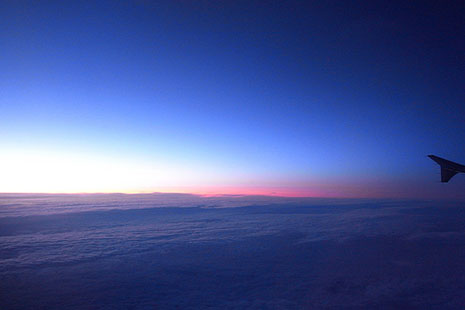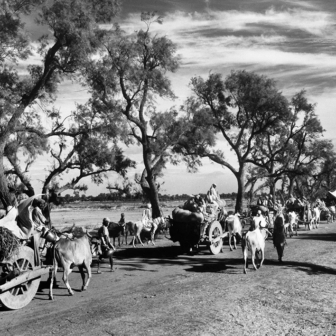LATER THIS WEEK, my wife, my three-and-a-half year old daughter and I will brave the customary chaos out at Heathrow, and begin the twenty-four hour journey back to Australia for a three-week visit. It will be their first return visit since we arrived here in September 2007, my second: I was back for a week last February “on business,” the business of being interviewed for a job I didn’t get. During that visit, I was in Melbourne for a weekend, just in time to be able to sniff the smoke from those horrific bushfires; the same bushfires about which I’d recently been interviewed by the BBC as a local expert on all things Australian.
The interview – the one with the BBC, that is, not my prospective employer – appeared to me a rather fruitless exercise at the time; it seems even more so now. It’s not that it was a bad interview. I recall listening to the recording later, and reckon I did a pretty fair job. But all the same, even after little more than a year away from Australia, I felt uncomfortable talking about someone else’s horrific experience on the other side of the world, even when they were “my people.” I knew I was out of touch in almost every meaningful way. It was, in the usual mid-winter British way, cold, dark and pouring that night, and just a few days earlier London had experienced a snowfall so heavy by local standards that it virtually shut down the city. I might as well have been on another planet.
My Australian-born daughter certainly sometimes becomes confused on this matter of the difference between another hemisphere and another planet. She knows quite a bit about Australia, mainly through the stories we read her and one of her favourite cartoons on CBeebies, The Koala Brothers. “Australia,” she says, is “where the Koala Brothers and Nanny and Pa and Nonna live,” naming her three grandparents alongside the two celebrity marsupials. But on other occasions, she’s told me that Nonna lives “in the telephone,” while Nanny and Pa live on Saturn, “the one with the rings.”
From her perspective, she’s right about Nonna, if a bit off the mark about Nanny and Pa, but she’ll soon realise that Australia and Saturn are quite different beasts. I hope she’s not too disappointed by the land of her birth because she won’t hold back in saying so, and in her pronounced southern English accent. Her father made all sorts of promises about what she would find in Italy when we were planning a holiday last Easter. “This isn’t Italy,” she declared loudly when we landed in a rainy Pisa. “There’s no food!” But soon enough, the apparently endless supply of pizza and gelati convinced her that daddy had been right after all.
THERE ARE MOMENTS at this time of the year, but only at this time of the year, when if you’re prepared to overlook an inconvenient detail here and there, you might almost believe you’re back in Australia. London is certainly at its most “Australian” during a hot summer. Or, at least, that was my verdict until about a week ago, when it turned cold and wet just in time for the Ashes series.
The pungent smell of the barbeque emanating from the garden in the middle of the square where we live certainly smelt like Australia. On the other hand, Australian men are not, as far as I can recall, in the habit of taking off their shirts and sun baking in public parks the moment the temperature reaches 13 degrees Celsius. Nor – and here my memory may well be faulty – was the aroma on the Melbourne Loop quite as – how shall I put it? – “whiffy,” as on the Tube on a warm summer’s day. But even during a recession there’s a relaxed atmosphere in London, as young professionals stand outside the pubs in the early evening, drinking their pint or seven before making the most, for just a while, of being able to travel home in daylight and occasionally even sunshine.
Their world – indeed, almost everyone’s – has changed dramatically in the less than two years since we arrived at Heathrow that September. Gordon Brown was recently installed, apparently enjoying a political honeymoon and pondering the possibility of an early election. The financial sector was booming, the local Masters of the Universe apparently confident that the world remained at their feet, ever greater riches within their grasp. The United Kingdom was a magnet for the world’s young and aspirational, who possibly saw in the dynamism of its major cities, and especially London, a reflection of, as much as an outlet for, their own ambitions.
Even for those of us who arrived in London without expectations of vast riches – and that would include anyone taking up an academic appointment – the energy was nevertheless palpable. These days, by way of contrast, the words of the Australian poet, A.D. Hope, seem more apt – our “boast is not: ‘we live’ but ‘we survive’.” Friends who arrived from the United States at the same time as us have returned from whence they came, that job in The City having turned out to be “an experience” rather than the glittering prize it appeared a couple of years ago. Another, more senior American banker friend, one who has survived, tells me that he sometimes finds social situations uncomfortable because people are inclined to blame him for the global financial crisis. My students worry about their job prospects, for graduate unemployment is climbing. A recent report indicated that one job was lost every five minutes in London over the last three months, and the national unemployment rate is predicted to peak at 3.2 million.
I’m often asked by people over here how things are going in Australia. How is it weathering the storm? I usually say that not having such a large financial services sector, Australia hasn’t been hit quite so hard. That’s probably right but in reality, I have little idea how things are going in Australia. Better than here, I rather suspect, but even in the age of the World Wide Web, nobody can really keep in closer touch with the happenings on the other side of the globe than what’s happening in their own backyard. It’s one of the paradoxes of globalisation that most of us can’t treat where we live as a kind of airport transit lounge – that we become engaged with the local, in all its gravity and its triviality, even when it’s not really home.
But then, even before I get on the Tube to Heathrow, I’m on the way home. I REALLY THOUGHT I WOULD DIE, screamed the headlines of one of today’s free afternoon giveaways. “He’s backpack from the dead,” declared another. After twelve days lost in the wilderness near Katoomba – among “remote mountains in Australia,” readers were told – a young Londoner had been dramatically rescued.
And in this way, as Henry Lawson once said, “the mighty Bush ... is tethered to the world.” •




